Human Development Theories: Erikson's Psychosocial Stages Analysis
VerifiedAdded on 2022/11/28
|13
|4593
|203
Report
AI Summary
This report provides a comprehensive analysis of Erik Erikson's psychosocial theory, examining its application to counseling. It begins with an introduction to Erikson's theory, contrasting it with Freud's, and highlighting the importance of the ego and social interactions in human development. The report then delves into the eight stages of Erikson's theory, with a specific focus on the seventh stage, generativity versus stagnation, and the challenges faced by individuals in this stage. The author, a 42-year-old female, places herself within this stage and discusses the developmental tasks and psychosocial crises relevant to her current life circumstances, including societal pressures related to marital status. The report further explores the biological, psychological, and societal systems impacting the author, such as the mid-life crisis and societal expectations surrounding marriage and divorce. The report concludes by discussing the epigenetic principle of development and how individuals progress through Erikson's stages. The report provides a detailed exploration of the theory and its practical implications, offering valuable insights into human development across the lifespan.
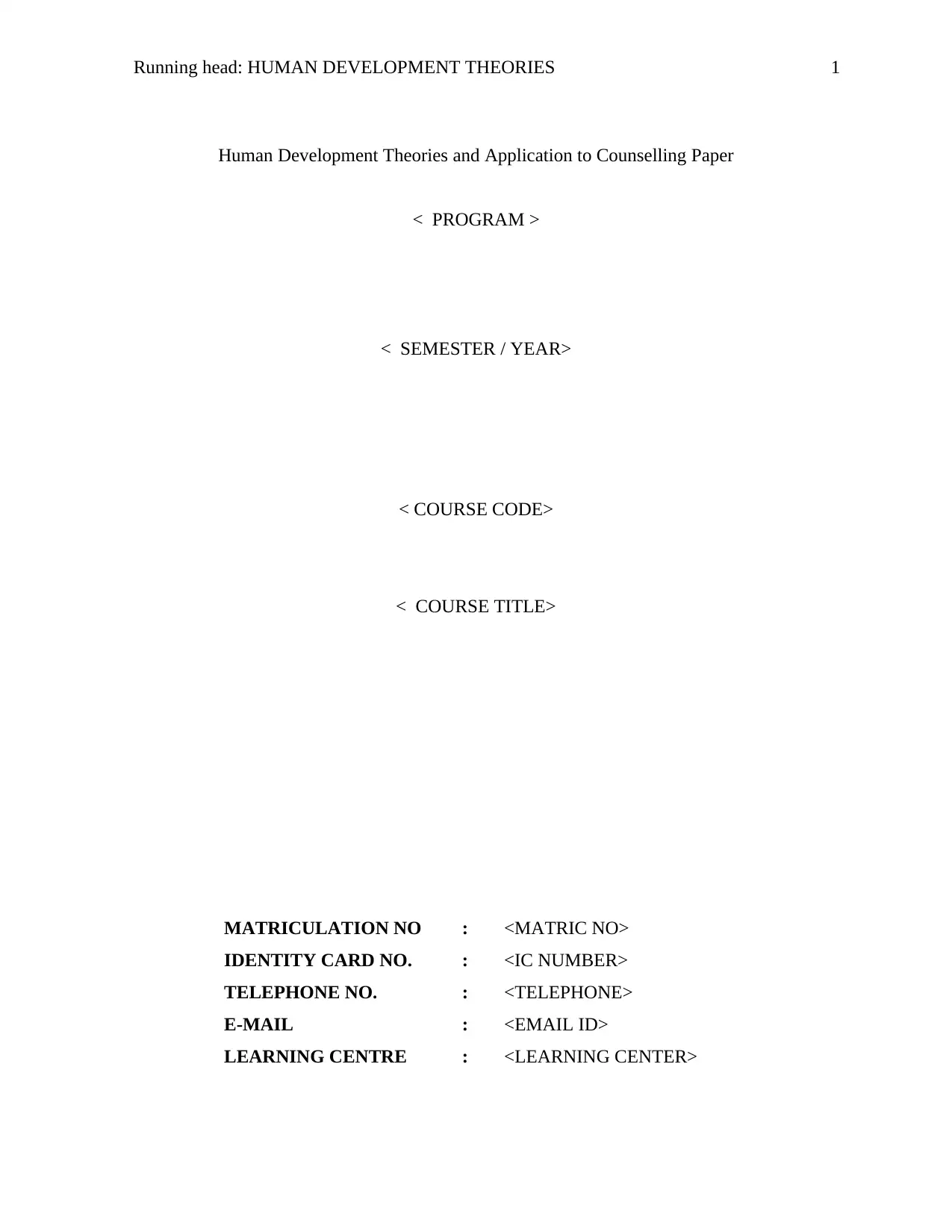
Running head: HUMAN DEVELOPMENT THEORIES 1
Human Development Theories and Application to Counselling Paper
< PROGRAM >
< SEMESTER / YEAR>
< COURSE CODE>
< COURSE TITLE>
MATRICULATION NO : <MATRIC NO>
IDENTITY CARD NO. : <IC NUMBER>
TELEPHONE NO. : <TELEPHONE>
E-MAIL : <EMAIL ID>
LEARNING CENTRE : <LEARNING CENTER>
Human Development Theories and Application to Counselling Paper
< PROGRAM >
< SEMESTER / YEAR>
< COURSE CODE>
< COURSE TITLE>
MATRICULATION NO : <MATRIC NO>
IDENTITY CARD NO. : <IC NUMBER>
TELEPHONE NO. : <TELEPHONE>
E-MAIL : <EMAIL ID>
LEARNING CENTRE : <LEARNING CENTER>
Paraphrase This Document
Need a fresh take? Get an instant paraphrase of this document with our AI Paraphraser
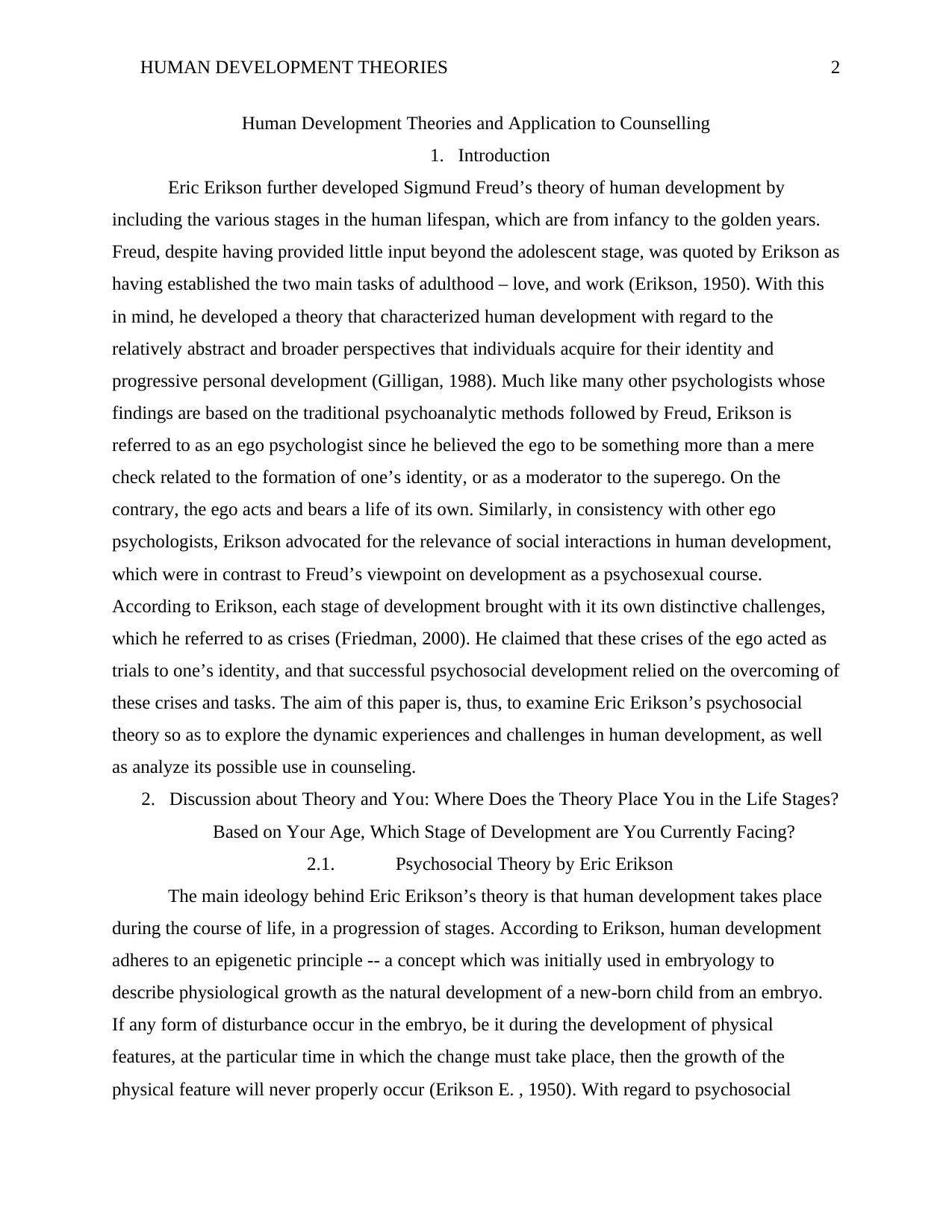
HUMAN DEVELOPMENT THEORIES 2
Human Development Theories and Application to Counselling
1. Introduction
Eric Erikson further developed Sigmund Freud’s theory of human development by
including the various stages in the human lifespan, which are from infancy to the golden years.
Freud, despite having provided little input beyond the adolescent stage, was quoted by Erikson as
having established the two main tasks of adulthood – love, and work (Erikson, 1950). With this
in mind, he developed a theory that characterized human development with regard to the
relatively abstract and broader perspectives that individuals acquire for their identity and
progressive personal development (Gilligan, 1988). Much like many other psychologists whose
findings are based on the traditional psychoanalytic methods followed by Freud, Erikson is
referred to as an ego psychologist since he believed the ego to be something more than a mere
check related to the formation of one’s identity, or as a moderator to the superego. On the
contrary, the ego acts and bears a life of its own. Similarly, in consistency with other ego
psychologists, Erikson advocated for the relevance of social interactions in human development,
which were in contrast to Freud’s viewpoint on development as a psychosexual course.
According to Erikson, each stage of development brought with it its own distinctive challenges,
which he referred to as crises (Friedman, 2000). He claimed that these crises of the ego acted as
trials to one’s identity, and that successful psychosocial development relied on the overcoming of
these crises and tasks. The aim of this paper is, thus, to examine Eric Erikson’s psychosocial
theory so as to explore the dynamic experiences and challenges in human development, as well
as analyze its possible use in counseling.
2. Discussion about Theory and You: Where Does the Theory Place You in the Life Stages?
Based on Your Age, Which Stage of Development are You Currently Facing?
2.1. Psychosocial Theory by Eric Erikson
The main ideology behind Eric Erikson’s theory is that human development takes place
during the course of life, in a progression of stages. According to Erikson, human development
adheres to an epigenetic principle -- a concept which was initially used in embryology to
describe physiological growth as the natural development of a new-born child from an embryo.
If any form of disturbance occur in the embryo, be it during the development of physical
features, at the particular time in which the change must take place, then the growth of the
physical feature will never properly occur (Erikson E. , 1950). With regard to psychosocial
Human Development Theories and Application to Counselling
1. Introduction
Eric Erikson further developed Sigmund Freud’s theory of human development by
including the various stages in the human lifespan, which are from infancy to the golden years.
Freud, despite having provided little input beyond the adolescent stage, was quoted by Erikson as
having established the two main tasks of adulthood – love, and work (Erikson, 1950). With this
in mind, he developed a theory that characterized human development with regard to the
relatively abstract and broader perspectives that individuals acquire for their identity and
progressive personal development (Gilligan, 1988). Much like many other psychologists whose
findings are based on the traditional psychoanalytic methods followed by Freud, Erikson is
referred to as an ego psychologist since he believed the ego to be something more than a mere
check related to the formation of one’s identity, or as a moderator to the superego. On the
contrary, the ego acts and bears a life of its own. Similarly, in consistency with other ego
psychologists, Erikson advocated for the relevance of social interactions in human development,
which were in contrast to Freud’s viewpoint on development as a psychosexual course.
According to Erikson, each stage of development brought with it its own distinctive challenges,
which he referred to as crises (Friedman, 2000). He claimed that these crises of the ego acted as
trials to one’s identity, and that successful psychosocial development relied on the overcoming of
these crises and tasks. The aim of this paper is, thus, to examine Eric Erikson’s psychosocial
theory so as to explore the dynamic experiences and challenges in human development, as well
as analyze its possible use in counseling.
2. Discussion about Theory and You: Where Does the Theory Place You in the Life Stages?
Based on Your Age, Which Stage of Development are You Currently Facing?
2.1. Psychosocial Theory by Eric Erikson
The main ideology behind Eric Erikson’s theory is that human development takes place
during the course of life, in a progression of stages. According to Erikson, human development
adheres to an epigenetic principle -- a concept which was initially used in embryology to
describe physiological growth as the natural development of a new-born child from an embryo.
If any form of disturbance occur in the embryo, be it during the development of physical
features, at the particular time in which the change must take place, then the growth of the
physical feature will never properly occur (Erikson E. , 1950). With regard to psychosocial
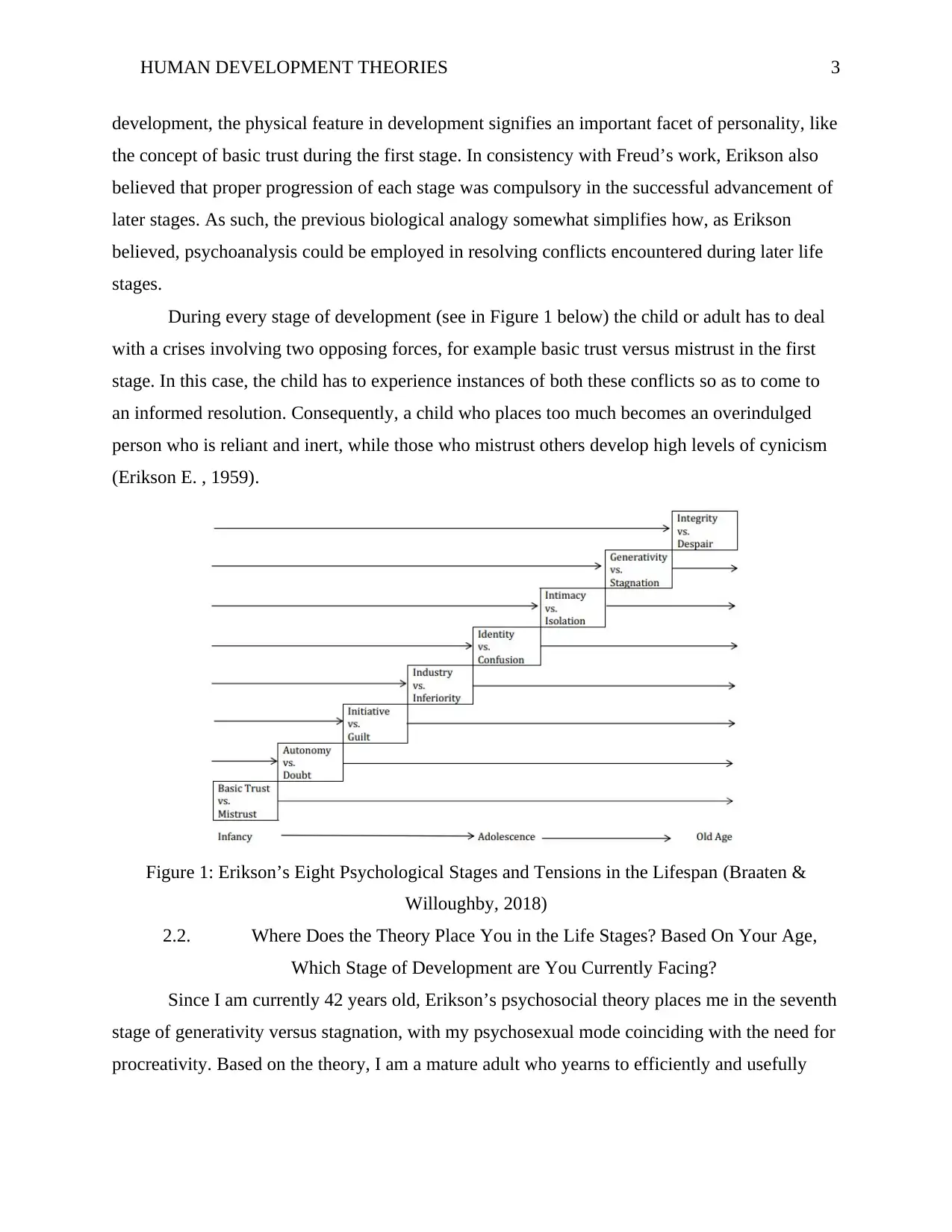
HUMAN DEVELOPMENT THEORIES 3
development, the physical feature in development signifies an important facet of personality, like
the concept of basic trust during the first stage. In consistency with Freud’s work, Erikson also
believed that proper progression of each stage was compulsory in the successful advancement of
later stages. As such, the previous biological analogy somewhat simplifies how, as Erikson
believed, psychoanalysis could be employed in resolving conflicts encountered during later life
stages.
During every stage of development (see in Figure 1 below) the child or adult has to deal
with a crises involving two opposing forces, for example basic trust versus mistrust in the first
stage. In this case, the child has to experience instances of both these conflicts so as to come to
an informed resolution. Consequently, a child who places too much becomes an overindulged
person who is reliant and inert, while those who mistrust others develop high levels of cynicism
(Erikson E. , 1959).
Figure 1: Erikson’s Eight Psychological Stages and Tensions in the Lifespan (Braaten &
Willoughby, 2018)
2.2. Where Does the Theory Place You in the Life Stages? Based On Your Age,
Which Stage of Development are You Currently Facing?
Since I am currently 42 years old, Erikson’s psychosocial theory places me in the seventh
stage of generativity versus stagnation, with my psychosexual mode coinciding with the need for
procreativity. Based on the theory, I am a mature adult who yearns to efficiently and usefully
development, the physical feature in development signifies an important facet of personality, like
the concept of basic trust during the first stage. In consistency with Freud’s work, Erikson also
believed that proper progression of each stage was compulsory in the successful advancement of
later stages. As such, the previous biological analogy somewhat simplifies how, as Erikson
believed, psychoanalysis could be employed in resolving conflicts encountered during later life
stages.
During every stage of development (see in Figure 1 below) the child or adult has to deal
with a crises involving two opposing forces, for example basic trust versus mistrust in the first
stage. In this case, the child has to experience instances of both these conflicts so as to come to
an informed resolution. Consequently, a child who places too much becomes an overindulged
person who is reliant and inert, while those who mistrust others develop high levels of cynicism
(Erikson E. , 1959).
Figure 1: Erikson’s Eight Psychological Stages and Tensions in the Lifespan (Braaten &
Willoughby, 2018)
2.2. Where Does the Theory Place You in the Life Stages? Based On Your Age,
Which Stage of Development are You Currently Facing?
Since I am currently 42 years old, Erikson’s psychosocial theory places me in the seventh
stage of generativity versus stagnation, with my psychosexual mode coinciding with the need for
procreativity. Based on the theory, I am a mature adult who yearns to efficiently and usefully
⊘ This is a preview!⊘
Do you want full access?
Subscribe today to unlock all pages.

Trusted by 1+ million students worldwide
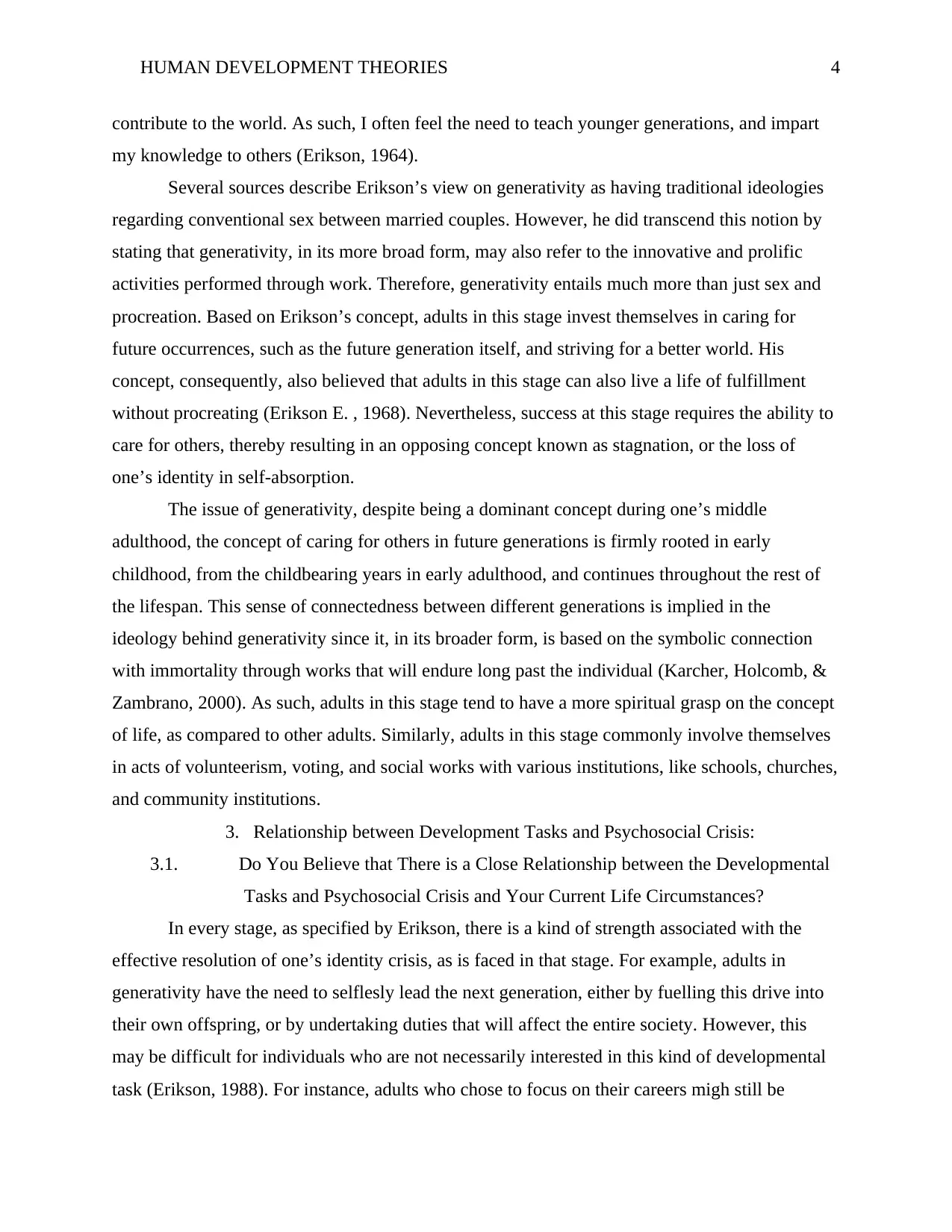
HUMAN DEVELOPMENT THEORIES 4
contribute to the world. As such, I often feel the need to teach younger generations, and impart
my knowledge to others (Erikson, 1964).
Several sources describe Erikson’s view on generativity as having traditional ideologies
regarding conventional sex between married couples. However, he did transcend this notion by
stating that generativity, in its more broad form, may also refer to the innovative and prolific
activities performed through work. Therefore, generativity entails much more than just sex and
procreation. Based on Erikson’s concept, adults in this stage invest themselves in caring for
future occurrences, such as the future generation itself, and striving for a better world. His
concept, consequently, also believed that adults in this stage can also live a life of fulfillment
without procreating (Erikson E. , 1968). Nevertheless, success at this stage requires the ability to
care for others, thereby resulting in an opposing concept known as stagnation, or the loss of
one’s identity in self-absorption.
The issue of generativity, despite being a dominant concept during one’s middle
adulthood, the concept of caring for others in future generations is firmly rooted in early
childhood, from the childbearing years in early adulthood, and continues throughout the rest of
the lifespan. This sense of connectedness between different generations is implied in the
ideology behind generativity since it, in its broader form, is based on the symbolic connection
with immortality through works that will endure long past the individual (Karcher, Holcomb, &
Zambrano, 2000). As such, adults in this stage tend to have a more spiritual grasp on the concept
of life, as compared to other adults. Similarly, adults in this stage commonly involve themselves
in acts of volunteerism, voting, and social works with various institutions, like schools, churches,
and community institutions.
3. Relationship between Development Tasks and Psychosocial Crisis:
3.1. Do You Believe that There is a Close Relationship between the Developmental
Tasks and Psychosocial Crisis and Your Current Life Circumstances?
In every stage, as specified by Erikson, there is a kind of strength associated with the
effective resolution of one’s identity crisis, as is faced in that stage. For example, adults in
generativity have the need to selflesly lead the next generation, either by fuelling this drive into
their own offspring, or by undertaking duties that will affect the entire society. However, this
may be difficult for individuals who are not necessarily interested in this kind of developmental
task (Erikson, 1988). For instance, adults who chose to focus on their careers migh still be
contribute to the world. As such, I often feel the need to teach younger generations, and impart
my knowledge to others (Erikson, 1964).
Several sources describe Erikson’s view on generativity as having traditional ideologies
regarding conventional sex between married couples. However, he did transcend this notion by
stating that generativity, in its more broad form, may also refer to the innovative and prolific
activities performed through work. Therefore, generativity entails much more than just sex and
procreation. Based on Erikson’s concept, adults in this stage invest themselves in caring for
future occurrences, such as the future generation itself, and striving for a better world. His
concept, consequently, also believed that adults in this stage can also live a life of fulfillment
without procreating (Erikson E. , 1968). Nevertheless, success at this stage requires the ability to
care for others, thereby resulting in an opposing concept known as stagnation, or the loss of
one’s identity in self-absorption.
The issue of generativity, despite being a dominant concept during one’s middle
adulthood, the concept of caring for others in future generations is firmly rooted in early
childhood, from the childbearing years in early adulthood, and continues throughout the rest of
the lifespan. This sense of connectedness between different generations is implied in the
ideology behind generativity since it, in its broader form, is based on the symbolic connection
with immortality through works that will endure long past the individual (Karcher, Holcomb, &
Zambrano, 2000). As such, adults in this stage tend to have a more spiritual grasp on the concept
of life, as compared to other adults. Similarly, adults in this stage commonly involve themselves
in acts of volunteerism, voting, and social works with various institutions, like schools, churches,
and community institutions.
3. Relationship between Development Tasks and Psychosocial Crisis:
3.1. Do You Believe that There is a Close Relationship between the Developmental
Tasks and Psychosocial Crisis and Your Current Life Circumstances?
In every stage, as specified by Erikson, there is a kind of strength associated with the
effective resolution of one’s identity crisis, as is faced in that stage. For example, adults in
generativity have the need to selflesly lead the next generation, either by fuelling this drive into
their own offspring, or by undertaking duties that will affect the entire society. However, this
may be difficult for individuals who are not necessarily interested in this kind of developmental
task (Erikson, 1988). For instance, adults who chose to focus on their careers migh still be
Paraphrase This Document
Need a fresh take? Get an instant paraphrase of this document with our AI Paraphraser
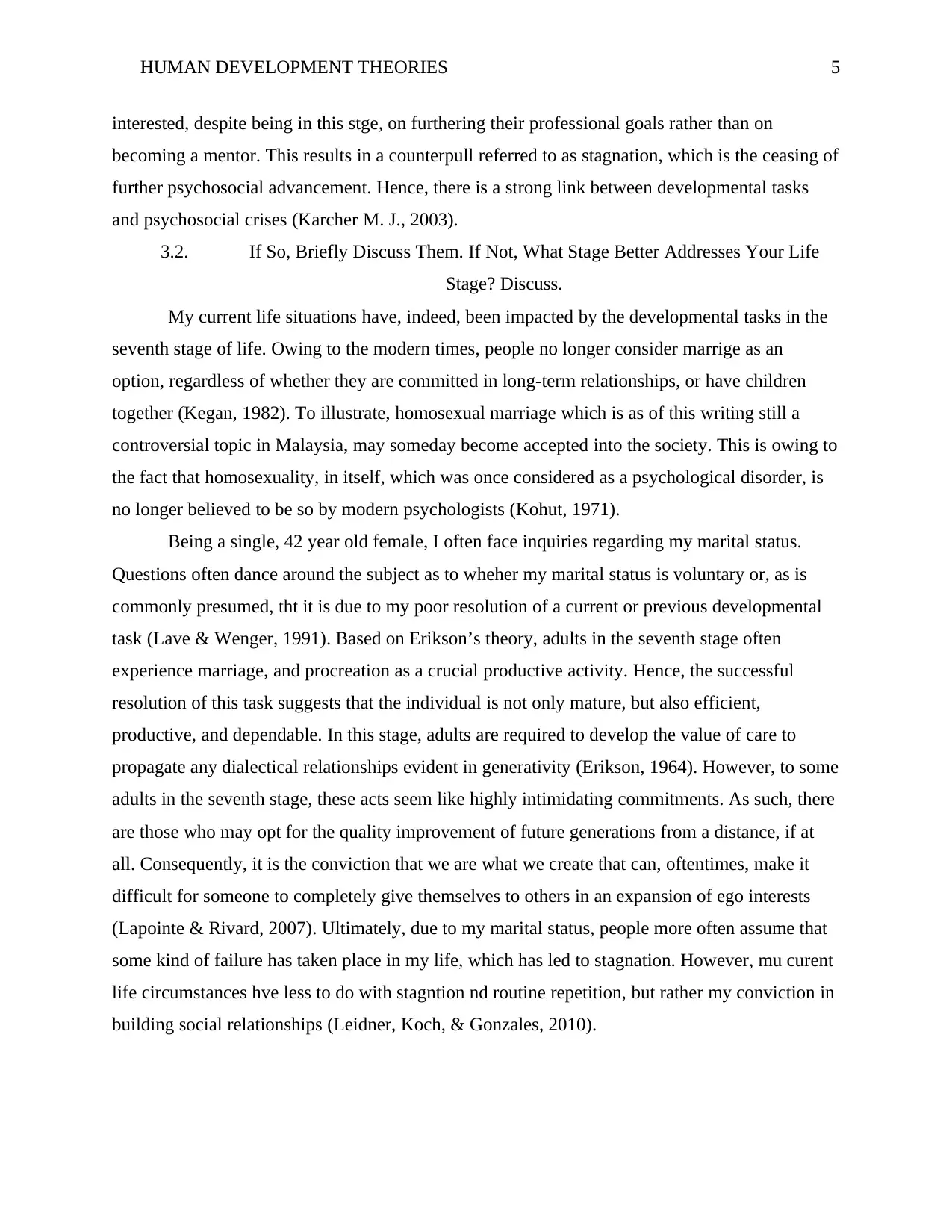
HUMAN DEVELOPMENT THEORIES 5
interested, despite being in this stge, on furthering their professional goals rather than on
becoming a mentor. This results in a counterpull referred to as stagnation, which is the ceasing of
further psychosocial advancement. Hence, there is a strong link between developmental tasks
and psychosocial crises (Karcher M. J., 2003).
3.2. If So, Briefly Discuss Them. If Not, What Stage Better Addresses Your Life
Stage? Discuss.
My current life situations have, indeed, been impacted by the developmental tasks in the
seventh stage of life. Owing to the modern times, people no longer consider marrige as an
option, regardless of whether they are committed in long-term relationships, or have children
together (Kegan, 1982). To illustrate, homosexual marriage which is as of this writing still a
controversial topic in Malaysia, may someday become accepted into the society. This is owing to
the fact that homosexuality, in itself, which was once considered as a psychological disorder, is
no longer believed to be so by modern psychologists (Kohut, 1971).
Being a single, 42 year old female, I often face inquiries regarding my marital status.
Questions often dance around the subject as to wheher my marital status is voluntary or, as is
commonly presumed, tht it is due to my poor resolution of a current or previous developmental
task (Lave & Wenger, 1991). Based on Erikson’s theory, adults in the seventh stage often
experience marriage, and procreation as a crucial productive activity. Hence, the successful
resolution of this task suggests that the individual is not only mature, but also efficient,
productive, and dependable. In this stage, adults are required to develop the value of care to
propagate any dialectical relationships evident in generativity (Erikson, 1964). However, to some
adults in the seventh stage, these acts seem like highly intimidating commitments. As such, there
are those who may opt for the quality improvement of future generations from a distance, if at
all. Consequently, it is the conviction that we are what we create that can, oftentimes, make it
difficult for someone to completely give themselves to others in an expansion of ego interests
(Lapointe & Rivard, 2007). Ultimately, due to my marital status, people more often assume that
some kind of failure has taken place in my life, which has led to stagnation. However, mu curent
life circumstances hve less to do with stagntion nd routine repetition, but rather my conviction in
building social relationships (Leidner, Koch, & Gonzales, 2010).
interested, despite being in this stge, on furthering their professional goals rather than on
becoming a mentor. This results in a counterpull referred to as stagnation, which is the ceasing of
further psychosocial advancement. Hence, there is a strong link between developmental tasks
and psychosocial crises (Karcher M. J., 2003).
3.2. If So, Briefly Discuss Them. If Not, What Stage Better Addresses Your Life
Stage? Discuss.
My current life situations have, indeed, been impacted by the developmental tasks in the
seventh stage of life. Owing to the modern times, people no longer consider marrige as an
option, regardless of whether they are committed in long-term relationships, or have children
together (Kegan, 1982). To illustrate, homosexual marriage which is as of this writing still a
controversial topic in Malaysia, may someday become accepted into the society. This is owing to
the fact that homosexuality, in itself, which was once considered as a psychological disorder, is
no longer believed to be so by modern psychologists (Kohut, 1971).
Being a single, 42 year old female, I often face inquiries regarding my marital status.
Questions often dance around the subject as to wheher my marital status is voluntary or, as is
commonly presumed, tht it is due to my poor resolution of a current or previous developmental
task (Lave & Wenger, 1991). Based on Erikson’s theory, adults in the seventh stage often
experience marriage, and procreation as a crucial productive activity. Hence, the successful
resolution of this task suggests that the individual is not only mature, but also efficient,
productive, and dependable. In this stage, adults are required to develop the value of care to
propagate any dialectical relationships evident in generativity (Erikson, 1964). However, to some
adults in the seventh stage, these acts seem like highly intimidating commitments. As such, there
are those who may opt for the quality improvement of future generations from a distance, if at
all. Consequently, it is the conviction that we are what we create that can, oftentimes, make it
difficult for someone to completely give themselves to others in an expansion of ego interests
(Lapointe & Rivard, 2007). Ultimately, due to my marital status, people more often assume that
some kind of failure has taken place in my life, which has led to stagnation. However, mu curent
life circumstances hve less to do with stagntion nd routine repetition, but rather my conviction in
building social relationships (Leidner, Koch, & Gonzales, 2010).
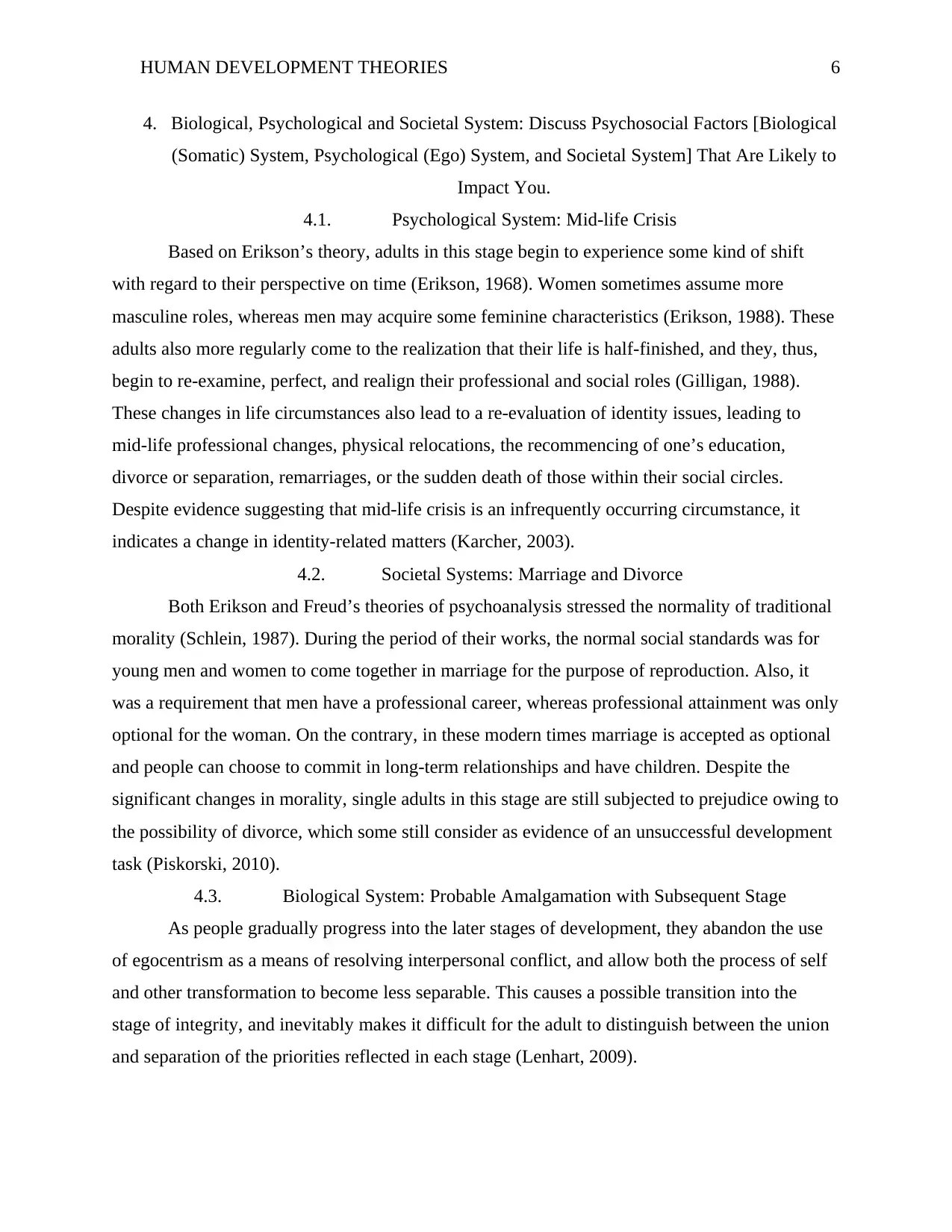
HUMAN DEVELOPMENT THEORIES 6
4. Biological, Psychological and Societal System: Discuss Psychosocial Factors [Biological
(Somatic) System, Psychological (Ego) System, and Societal System] That Are Likely to
Impact You.
4.1. Psychological System: Mid-life Crisis
Based on Erikson’s theory, adults in this stage begin to experience some kind of shift
with regard to their perspective on time (Erikson, 1968). Women sometimes assume more
masculine roles, whereas men may acquire some feminine characteristics (Erikson, 1988). These
adults also more regularly come to the realization that their life is half-finished, and they, thus,
begin to re-examine, perfect, and realign their professional and social roles (Gilligan, 1988).
These changes in life circumstances also lead to a re-evaluation of identity issues, leading to
mid-life professional changes, physical relocations, the recommencing of one’s education,
divorce or separation, remarriages, or the sudden death of those within their social circles.
Despite evidence suggesting that mid-life crisis is an infrequently occurring circumstance, it
indicates a change in identity-related matters (Karcher, 2003).
4.2. Societal Systems: Marriage and Divorce
Both Erikson and Freud’s theories of psychoanalysis stressed the normality of traditional
morality (Schlein, 1987). During the period of their works, the normal social standards was for
young men and women to come together in marriage for the purpose of reproduction. Also, it
was a requirement that men have a professional career, whereas professional attainment was only
optional for the woman. On the contrary, in these modern times marriage is accepted as optional
and people can choose to commit in long-term relationships and have children. Despite the
significant changes in morality, single adults in this stage are still subjected to prejudice owing to
the possibility of divorce, which some still consider as evidence of an unsuccessful development
task (Piskorski, 2010).
4.3. Biological System: Probable Amalgamation with Subsequent Stage
As people gradually progress into the later stages of development, they abandon the use
of egocentrism as a means of resolving interpersonal conflict, and allow both the process of self
and other transformation to become less separable. This causes a possible transition into the
stage of integrity, and inevitably makes it difficult for the adult to distinguish between the union
and separation of the priorities reflected in each stage (Lenhart, 2009).
4. Biological, Psychological and Societal System: Discuss Psychosocial Factors [Biological
(Somatic) System, Psychological (Ego) System, and Societal System] That Are Likely to
Impact You.
4.1. Psychological System: Mid-life Crisis
Based on Erikson’s theory, adults in this stage begin to experience some kind of shift
with regard to their perspective on time (Erikson, 1968). Women sometimes assume more
masculine roles, whereas men may acquire some feminine characteristics (Erikson, 1988). These
adults also more regularly come to the realization that their life is half-finished, and they, thus,
begin to re-examine, perfect, and realign their professional and social roles (Gilligan, 1988).
These changes in life circumstances also lead to a re-evaluation of identity issues, leading to
mid-life professional changes, physical relocations, the recommencing of one’s education,
divorce or separation, remarriages, or the sudden death of those within their social circles.
Despite evidence suggesting that mid-life crisis is an infrequently occurring circumstance, it
indicates a change in identity-related matters (Karcher, 2003).
4.2. Societal Systems: Marriage and Divorce
Both Erikson and Freud’s theories of psychoanalysis stressed the normality of traditional
morality (Schlein, 1987). During the period of their works, the normal social standards was for
young men and women to come together in marriage for the purpose of reproduction. Also, it
was a requirement that men have a professional career, whereas professional attainment was only
optional for the woman. On the contrary, in these modern times marriage is accepted as optional
and people can choose to commit in long-term relationships and have children. Despite the
significant changes in morality, single adults in this stage are still subjected to prejudice owing to
the possibility of divorce, which some still consider as evidence of an unsuccessful development
task (Piskorski, 2010).
4.3. Biological System: Probable Amalgamation with Subsequent Stage
As people gradually progress into the later stages of development, they abandon the use
of egocentrism as a means of resolving interpersonal conflict, and allow both the process of self
and other transformation to become less separable. This causes a possible transition into the
stage of integrity, and inevitably makes it difficult for the adult to distinguish between the union
and separation of the priorities reflected in each stage (Lenhart, 2009).
⊘ This is a preview!⊘
Do you want full access?
Subscribe today to unlock all pages.

Trusted by 1+ million students worldwide
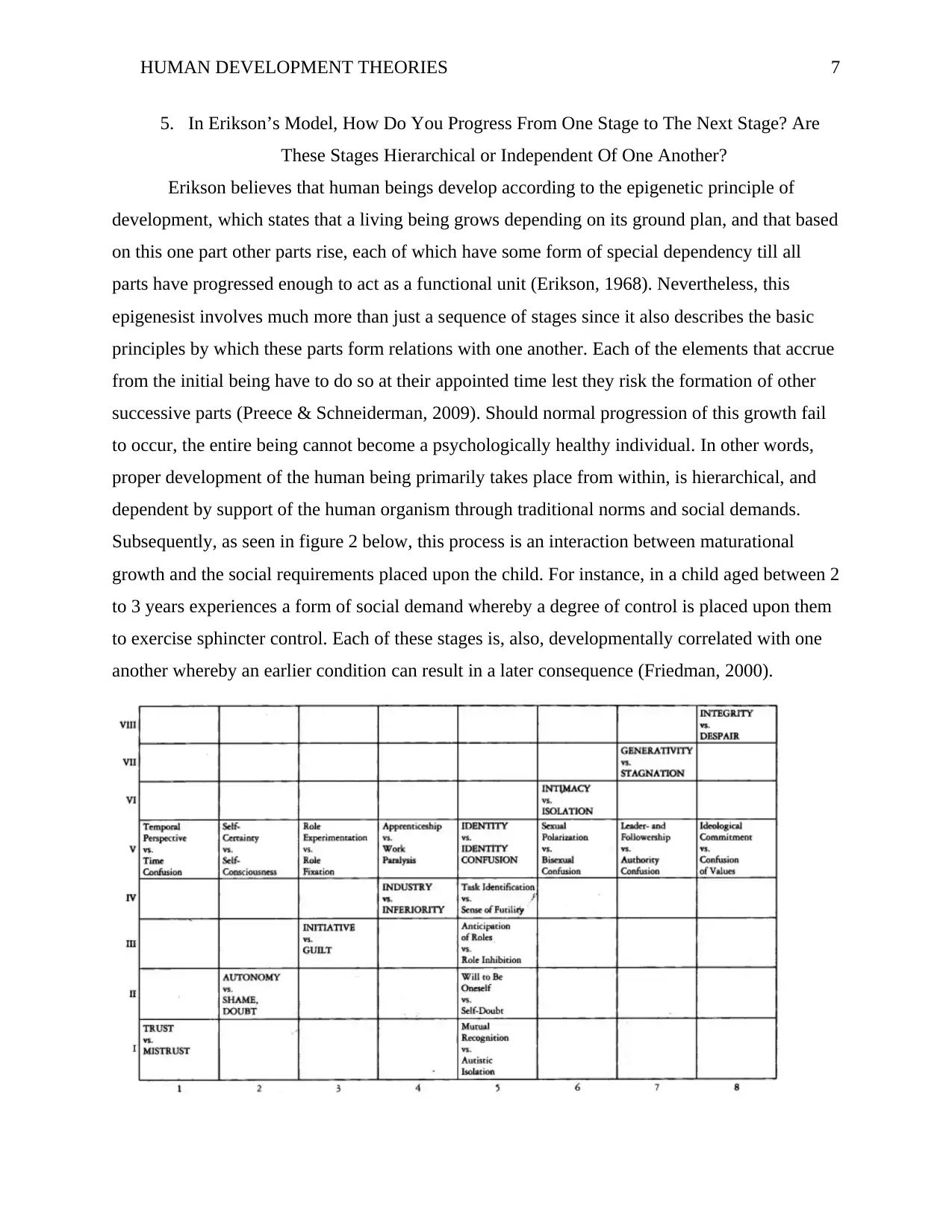
HUMAN DEVELOPMENT THEORIES 7
5. In Erikson’s Model, How Do You Progress From One Stage to The Next Stage? Are
These Stages Hierarchical or Independent Of One Another?
Erikson believes that human beings develop according to the epigenetic principle of
development, which states that a living being grows depending on its ground plan, and that based
on this one part other parts rise, each of which have some form of special dependency till all
parts have progressed enough to act as a functional unit (Erikson, 1968). Nevertheless, this
epigenesist involves much more than just a sequence of stages since it also describes the basic
principles by which these parts form relations with one another. Each of the elements that accrue
from the initial being have to do so at their appointed time lest they risk the formation of other
successive parts (Preece & Schneiderman, 2009). Should normal progression of this growth fail
to occur, the entire being cannot become a psychologically healthy individual. In other words,
proper development of the human being primarily takes place from within, is hierarchical, and
dependent by support of the human organism through traditional norms and social demands.
Subsequently, as seen in figure 2 below, this process is an interaction between maturational
growth and the social requirements placed upon the child. For instance, in a child aged between 2
to 3 years experiences a form of social demand whereby a degree of control is placed upon them
to exercise sphincter control. Each of these stages is, also, developmentally correlated with one
another whereby an earlier condition can result in a later consequence (Friedman, 2000).
5. In Erikson’s Model, How Do You Progress From One Stage to The Next Stage? Are
These Stages Hierarchical or Independent Of One Another?
Erikson believes that human beings develop according to the epigenetic principle of
development, which states that a living being grows depending on its ground plan, and that based
on this one part other parts rise, each of which have some form of special dependency till all
parts have progressed enough to act as a functional unit (Erikson, 1968). Nevertheless, this
epigenesist involves much more than just a sequence of stages since it also describes the basic
principles by which these parts form relations with one another. Each of the elements that accrue
from the initial being have to do so at their appointed time lest they risk the formation of other
successive parts (Preece & Schneiderman, 2009). Should normal progression of this growth fail
to occur, the entire being cannot become a psychologically healthy individual. In other words,
proper development of the human being primarily takes place from within, is hierarchical, and
dependent by support of the human organism through traditional norms and social demands.
Subsequently, as seen in figure 2 below, this process is an interaction between maturational
growth and the social requirements placed upon the child. For instance, in a child aged between 2
to 3 years experiences a form of social demand whereby a degree of control is placed upon them
to exercise sphincter control. Each of these stages is, also, developmentally correlated with one
another whereby an earlier condition can result in a later consequence (Friedman, 2000).
Paraphrase This Document
Need a fresh take? Get an instant paraphrase of this document with our AI Paraphraser
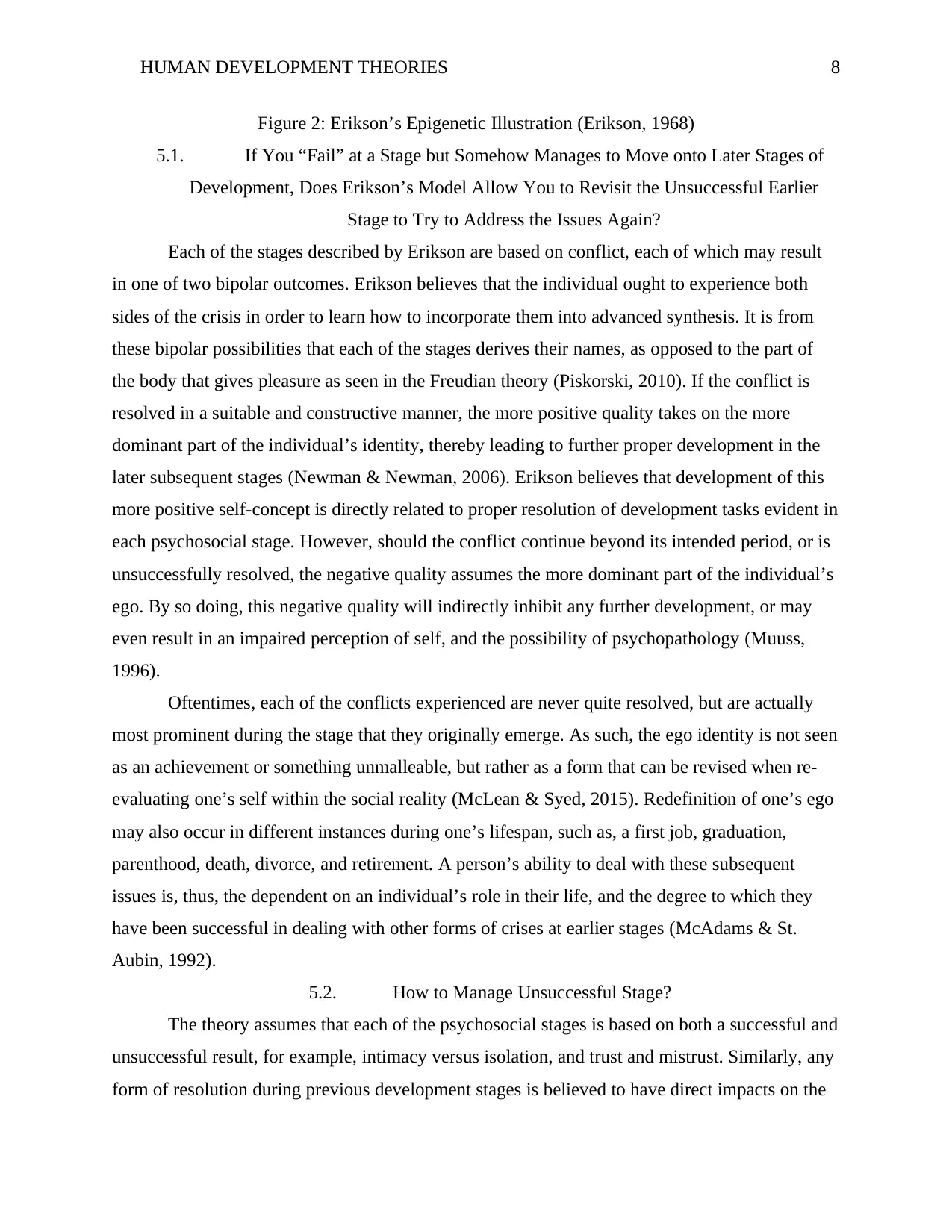
HUMAN DEVELOPMENT THEORIES 8
Figure 2: Erikson’s Epigenetic Illustration (Erikson, 1968)
5.1. If You “Fail” at a Stage but Somehow Manages to Move onto Later Stages of
Development, Does Erikson’s Model Allow You to Revisit the Unsuccessful Earlier
Stage to Try to Address the Issues Again?
Each of the stages described by Erikson are based on conflict, each of which may result
in one of two bipolar outcomes. Erikson believes that the individual ought to experience both
sides of the crisis in order to learn how to incorporate them into advanced synthesis. It is from
these bipolar possibilities that each of the stages derives their names, as opposed to the part of
the body that gives pleasure as seen in the Freudian theory (Piskorski, 2010). If the conflict is
resolved in a suitable and constructive manner, the more positive quality takes on the more
dominant part of the individual’s identity, thereby leading to further proper development in the
later subsequent stages (Newman & Newman, 2006). Erikson believes that development of this
more positive self-concept is directly related to proper resolution of development tasks evident in
each psychosocial stage. However, should the conflict continue beyond its intended period, or is
unsuccessfully resolved, the negative quality assumes the more dominant part of the individual’s
ego. By so doing, this negative quality will indirectly inhibit any further development, or may
even result in an impaired perception of self, and the possibility of psychopathology (Muuss,
1996).
Oftentimes, each of the conflicts experienced are never quite resolved, but are actually
most prominent during the stage that they originally emerge. As such, the ego identity is not seen
as an achievement or something unmalleable, but rather as a form that can be revised when re-
evaluating one’s self within the social reality (McLean & Syed, 2015). Redefinition of one’s ego
may also occur in different instances during one’s lifespan, such as, a first job, graduation,
parenthood, death, divorce, and retirement. A person’s ability to deal with these subsequent
issues is, thus, the dependent on an individual’s role in their life, and the degree to which they
have been successful in dealing with other forms of crises at earlier stages (McAdams & St.
Aubin, 1992).
5.2. How to Manage Unsuccessful Stage?
The theory assumes that each of the psychosocial stages is based on both a successful and
unsuccessful result, for example, intimacy versus isolation, and trust and mistrust. Similarly, any
form of resolution during previous development stages is believed to have direct impacts on the
Figure 2: Erikson’s Epigenetic Illustration (Erikson, 1968)
5.1. If You “Fail” at a Stage but Somehow Manages to Move onto Later Stages of
Development, Does Erikson’s Model Allow You to Revisit the Unsuccessful Earlier
Stage to Try to Address the Issues Again?
Each of the stages described by Erikson are based on conflict, each of which may result
in one of two bipolar outcomes. Erikson believes that the individual ought to experience both
sides of the crisis in order to learn how to incorporate them into advanced synthesis. It is from
these bipolar possibilities that each of the stages derives their names, as opposed to the part of
the body that gives pleasure as seen in the Freudian theory (Piskorski, 2010). If the conflict is
resolved in a suitable and constructive manner, the more positive quality takes on the more
dominant part of the individual’s identity, thereby leading to further proper development in the
later subsequent stages (Newman & Newman, 2006). Erikson believes that development of this
more positive self-concept is directly related to proper resolution of development tasks evident in
each psychosocial stage. However, should the conflict continue beyond its intended period, or is
unsuccessfully resolved, the negative quality assumes the more dominant part of the individual’s
ego. By so doing, this negative quality will indirectly inhibit any further development, or may
even result in an impaired perception of self, and the possibility of psychopathology (Muuss,
1996).
Oftentimes, each of the conflicts experienced are never quite resolved, but are actually
most prominent during the stage that they originally emerge. As such, the ego identity is not seen
as an achievement or something unmalleable, but rather as a form that can be revised when re-
evaluating one’s self within the social reality (McLean & Syed, 2015). Redefinition of one’s ego
may also occur in different instances during one’s lifespan, such as, a first job, graduation,
parenthood, death, divorce, and retirement. A person’s ability to deal with these subsequent
issues is, thus, the dependent on an individual’s role in their life, and the degree to which they
have been successful in dealing with other forms of crises at earlier stages (McAdams & St.
Aubin, 1992).
5.2. How to Manage Unsuccessful Stage?
The theory assumes that each of the psychosocial stages is based on both a successful and
unsuccessful result, for example, intimacy versus isolation, and trust and mistrust. Similarly, any
form of resolution during previous development stages is believed to have direct impacts on the
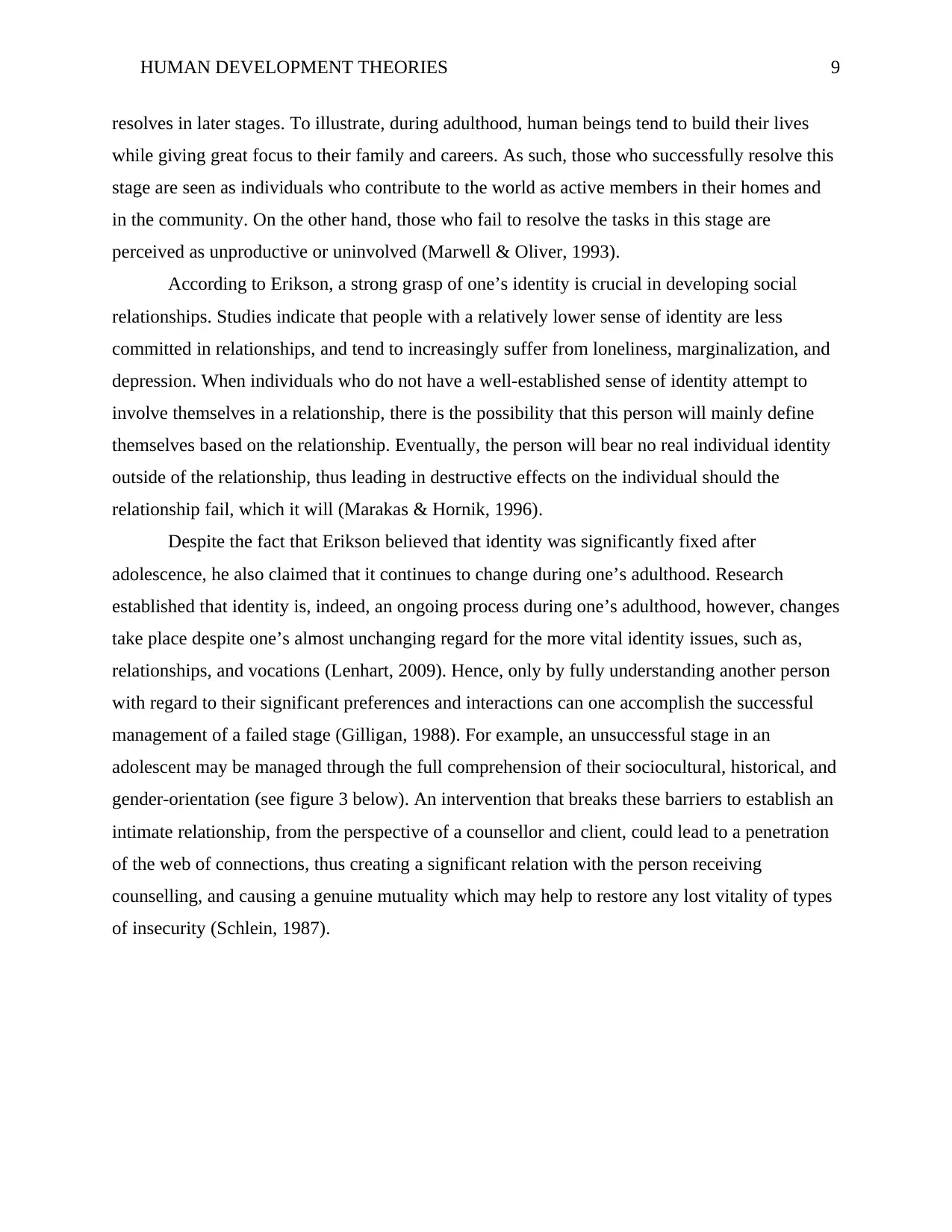
HUMAN DEVELOPMENT THEORIES 9
resolves in later stages. To illustrate, during adulthood, human beings tend to build their lives
while giving great focus to their family and careers. As such, those who successfully resolve this
stage are seen as individuals who contribute to the world as active members in their homes and
in the community. On the other hand, those who fail to resolve the tasks in this stage are
perceived as unproductive or uninvolved (Marwell & Oliver, 1993).
According to Erikson, a strong grasp of one’s identity is crucial in developing social
relationships. Studies indicate that people with a relatively lower sense of identity are less
committed in relationships, and tend to increasingly suffer from loneliness, marginalization, and
depression. When individuals who do not have a well-established sense of identity attempt to
involve themselves in a relationship, there is the possibility that this person will mainly define
themselves based on the relationship. Eventually, the person will bear no real individual identity
outside of the relationship, thus leading in destructive effects on the individual should the
relationship fail, which it will (Marakas & Hornik, 1996).
Despite the fact that Erikson believed that identity was significantly fixed after
adolescence, he also claimed that it continues to change during one’s adulthood. Research
established that identity is, indeed, an ongoing process during one’s adulthood, however, changes
take place despite one’s almost unchanging regard for the more vital identity issues, such as,
relationships, and vocations (Lenhart, 2009). Hence, only by fully understanding another person
with regard to their significant preferences and interactions can one accomplish the successful
management of a failed stage (Gilligan, 1988). For example, an unsuccessful stage in an
adolescent may be managed through the full comprehension of their sociocultural, historical, and
gender-orientation (see figure 3 below). An intervention that breaks these barriers to establish an
intimate relationship, from the perspective of a counsellor and client, could lead to a penetration
of the web of connections, thus creating a significant relation with the person receiving
counselling, and causing a genuine mutuality which may help to restore any lost vitality of types
of insecurity (Schlein, 1987).
resolves in later stages. To illustrate, during adulthood, human beings tend to build their lives
while giving great focus to their family and careers. As such, those who successfully resolve this
stage are seen as individuals who contribute to the world as active members in their homes and
in the community. On the other hand, those who fail to resolve the tasks in this stage are
perceived as unproductive or uninvolved (Marwell & Oliver, 1993).
According to Erikson, a strong grasp of one’s identity is crucial in developing social
relationships. Studies indicate that people with a relatively lower sense of identity are less
committed in relationships, and tend to increasingly suffer from loneliness, marginalization, and
depression. When individuals who do not have a well-established sense of identity attempt to
involve themselves in a relationship, there is the possibility that this person will mainly define
themselves based on the relationship. Eventually, the person will bear no real individual identity
outside of the relationship, thus leading in destructive effects on the individual should the
relationship fail, which it will (Marakas & Hornik, 1996).
Despite the fact that Erikson believed that identity was significantly fixed after
adolescence, he also claimed that it continues to change during one’s adulthood. Research
established that identity is, indeed, an ongoing process during one’s adulthood, however, changes
take place despite one’s almost unchanging regard for the more vital identity issues, such as,
relationships, and vocations (Lenhart, 2009). Hence, only by fully understanding another person
with regard to their significant preferences and interactions can one accomplish the successful
management of a failed stage (Gilligan, 1988). For example, an unsuccessful stage in an
adolescent may be managed through the full comprehension of their sociocultural, historical, and
gender-orientation (see figure 3 below). An intervention that breaks these barriers to establish an
intimate relationship, from the perspective of a counsellor and client, could lead to a penetration
of the web of connections, thus creating a significant relation with the person receiving
counselling, and causing a genuine mutuality which may help to restore any lost vitality of types
of insecurity (Schlein, 1987).
⊘ This is a preview!⊘
Do you want full access?
Subscribe today to unlock all pages.

Trusted by 1+ million students worldwide
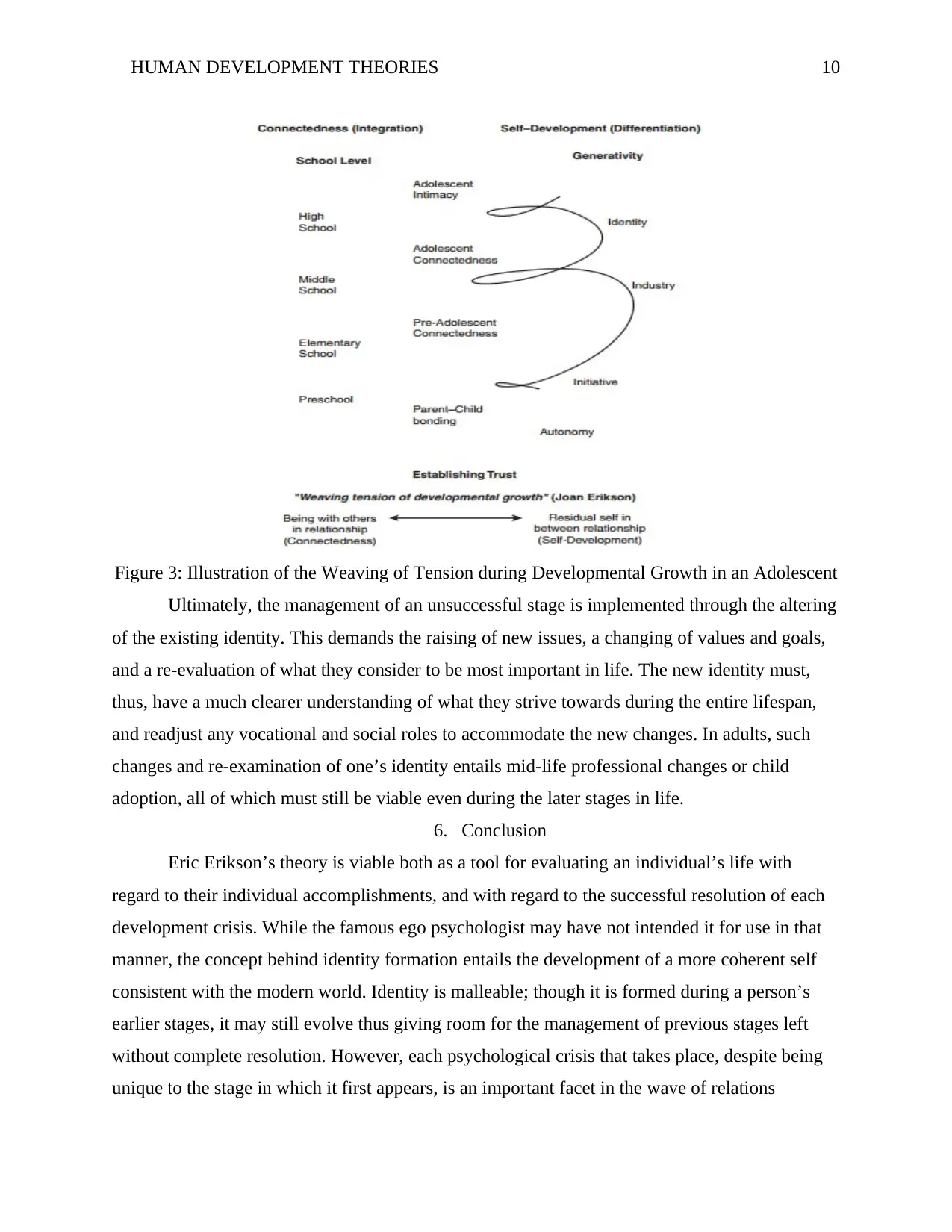
HUMAN DEVELOPMENT THEORIES 10
Figure 3: Illustration of the Weaving of Tension during Developmental Growth in an Adolescent
Ultimately, the management of an unsuccessful stage is implemented through the altering
of the existing identity. This demands the raising of new issues, a changing of values and goals,
and a re-evaluation of what they consider to be most important in life. The new identity must,
thus, have a much clearer understanding of what they strive towards during the entire lifespan,
and readjust any vocational and social roles to accommodate the new changes. In adults, such
changes and re-examination of one’s identity entails mid-life professional changes or child
adoption, all of which must still be viable even during the later stages in life.
6. Conclusion
Eric Erikson’s theory is viable both as a tool for evaluating an individual’s life with
regard to their individual accomplishments, and with regard to the successful resolution of each
development crisis. While the famous ego psychologist may have not intended it for use in that
manner, the concept behind identity formation entails the development of a more coherent self
consistent with the modern world. Identity is malleable; though it is formed during a person’s
earlier stages, it may still evolve thus giving room for the management of previous stages left
without complete resolution. However, each psychological crisis that takes place, despite being
unique to the stage in which it first appears, is an important facet in the wave of relations
Figure 3: Illustration of the Weaving of Tension during Developmental Growth in an Adolescent
Ultimately, the management of an unsuccessful stage is implemented through the altering
of the existing identity. This demands the raising of new issues, a changing of values and goals,
and a re-evaluation of what they consider to be most important in life. The new identity must,
thus, have a much clearer understanding of what they strive towards during the entire lifespan,
and readjust any vocational and social roles to accommodate the new changes. In adults, such
changes and re-examination of one’s identity entails mid-life professional changes or child
adoption, all of which must still be viable even during the later stages in life.
6. Conclusion
Eric Erikson’s theory is viable both as a tool for evaluating an individual’s life with
regard to their individual accomplishments, and with regard to the successful resolution of each
development crisis. While the famous ego psychologist may have not intended it for use in that
manner, the concept behind identity formation entails the development of a more coherent self
consistent with the modern world. Identity is malleable; though it is formed during a person’s
earlier stages, it may still evolve thus giving room for the management of previous stages left
without complete resolution. However, each psychological crisis that takes place, despite being
unique to the stage in which it first appears, is an important facet in the wave of relations
Paraphrase This Document
Need a fresh take? Get an instant paraphrase of this document with our AI Paraphraser
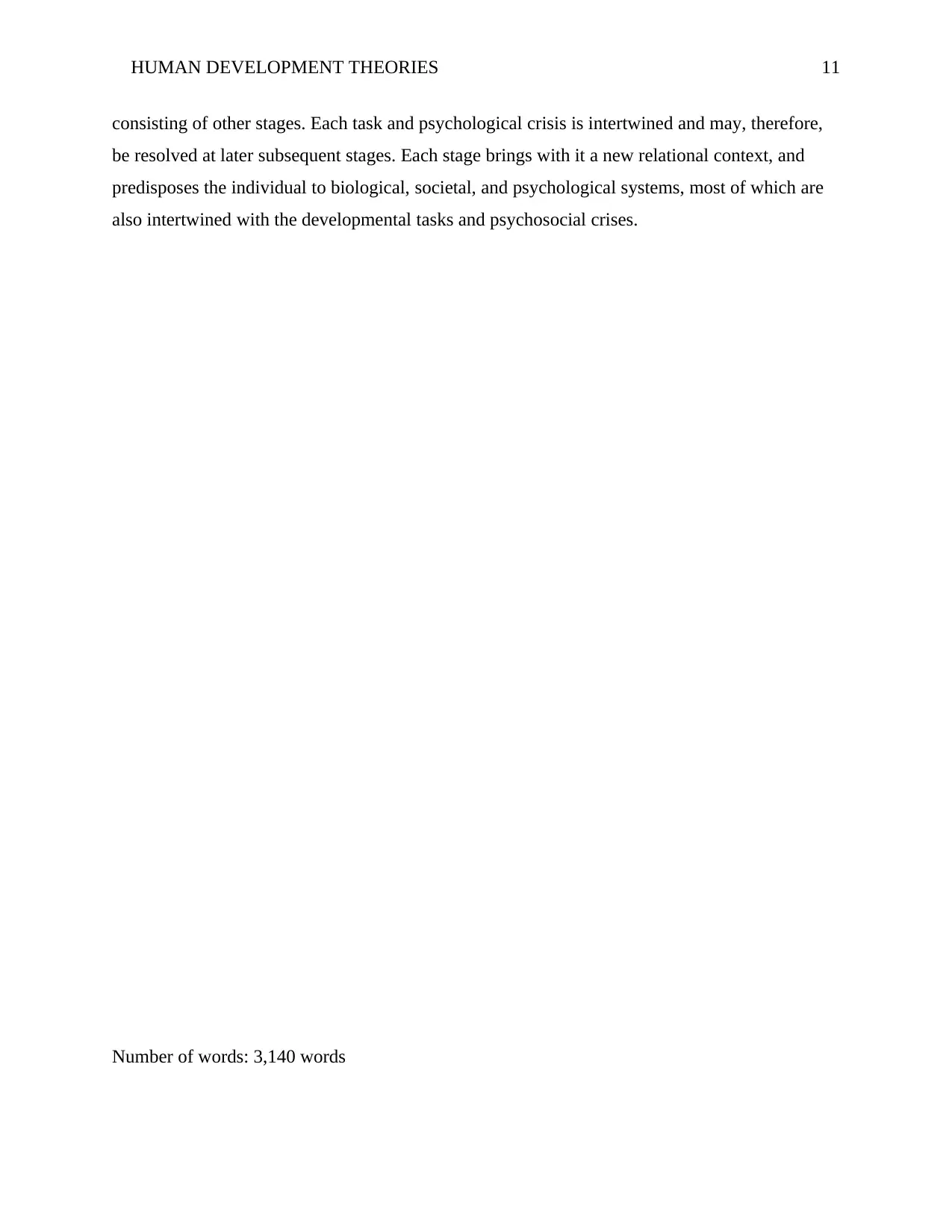
HUMAN DEVELOPMENT THEORIES 11
consisting of other stages. Each task and psychological crisis is intertwined and may, therefore,
be resolved at later subsequent stages. Each stage brings with it a new relational context, and
predisposes the individual to biological, societal, and psychological systems, most of which are
also intertwined with the developmental tasks and psychosocial crises.
Number of words: 3,140 words
consisting of other stages. Each task and psychological crisis is intertwined and may, therefore,
be resolved at later subsequent stages. Each stage brings with it a new relational context, and
predisposes the individual to biological, societal, and psychological systems, most of which are
also intertwined with the developmental tasks and psychosocial crises.
Number of words: 3,140 words
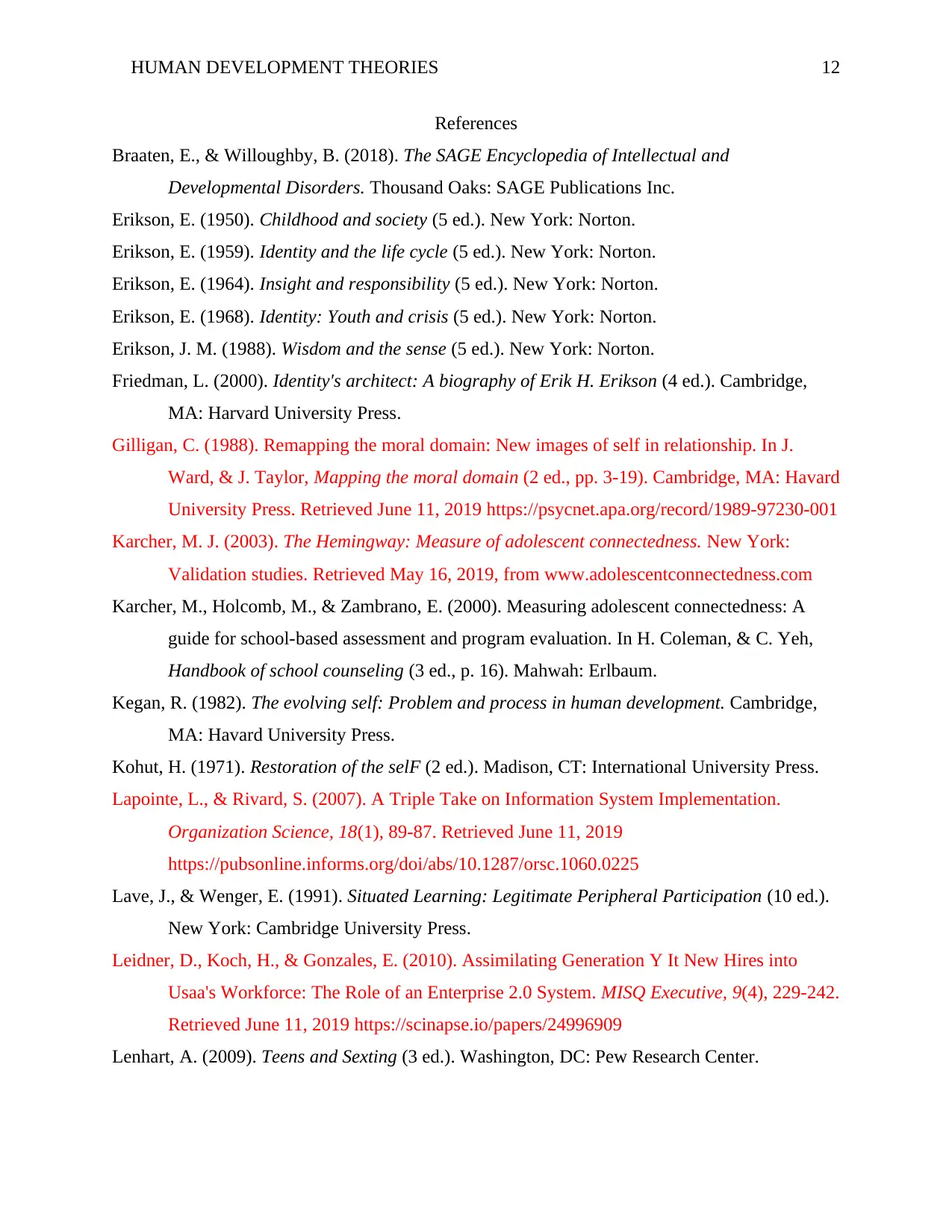
HUMAN DEVELOPMENT THEORIES 12
References
Braaten, E., & Willoughby, B. (2018). The SAGE Encyclopedia of Intellectual and
Developmental Disorders. Thousand Oaks: SAGE Publications Inc.
Erikson, E. (1950). Childhood and society (5 ed.). New York: Norton.
Erikson, E. (1959). Identity and the life cycle (5 ed.). New York: Norton.
Erikson, E. (1964). Insight and responsibility (5 ed.). New York: Norton.
Erikson, E. (1968). Identity: Youth and crisis (5 ed.). New York: Norton.
Erikson, J. M. (1988). Wisdom and the sense (5 ed.). New York: Norton.
Friedman, L. (2000). Identity's architect: A biography of Erik H. Erikson (4 ed.). Cambridge,
MA: Harvard University Press.
Gilligan, C. (1988). Remapping the moral domain: New images of self in relationship. In J.
Ward, & J. Taylor, Mapping the moral domain (2 ed., pp. 3-19). Cambridge, MA: Havard
University Press. Retrieved June 11, 2019 https://psycnet.apa.org/record/1989-97230-001
Karcher, M. J. (2003). The Hemingway: Measure of adolescent connectedness. New York:
Validation studies. Retrieved May 16, 2019, from www.adolescentconnectedness.com
Karcher, M., Holcomb, M., & Zambrano, E. (2000). Measuring adolescent connectedness: A
guide for school-based assessment and program evaluation. In H. Coleman, & C. Yeh,
Handbook of school counseling (3 ed., p. 16). Mahwah: Erlbaum.
Kegan, R. (1982). The evolving self: Problem and process in human development. Cambridge,
MA: Havard University Press.
Kohut, H. (1971). Restoration of the selF (2 ed.). Madison, CT: International University Press.
Lapointe, L., & Rivard, S. (2007). A Triple Take on Information System Implementation.
Organization Science, 18(1), 89-87. Retrieved June 11, 2019
https://pubsonline.informs.org/doi/abs/10.1287/orsc.1060.0225
Lave, J., & Wenger, E. (1991). Situated Learning: Legitimate Peripheral Participation (10 ed.).
New York: Cambridge University Press.
Leidner, D., Koch, H., & Gonzales, E. (2010). Assimilating Generation Y It New Hires into
Usaa's Workforce: The Role of an Enterprise 2.0 System. MISQ Executive, 9(4), 229-242.
Retrieved June 11, 2019 https://scinapse.io/papers/24996909
Lenhart, A. (2009). Teens and Sexting (3 ed.). Washington, DC: Pew Research Center.
References
Braaten, E., & Willoughby, B. (2018). The SAGE Encyclopedia of Intellectual and
Developmental Disorders. Thousand Oaks: SAGE Publications Inc.
Erikson, E. (1950). Childhood and society (5 ed.). New York: Norton.
Erikson, E. (1959). Identity and the life cycle (5 ed.). New York: Norton.
Erikson, E. (1964). Insight and responsibility (5 ed.). New York: Norton.
Erikson, E. (1968). Identity: Youth and crisis (5 ed.). New York: Norton.
Erikson, J. M. (1988). Wisdom and the sense (5 ed.). New York: Norton.
Friedman, L. (2000). Identity's architect: A biography of Erik H. Erikson (4 ed.). Cambridge,
MA: Harvard University Press.
Gilligan, C. (1988). Remapping the moral domain: New images of self in relationship. In J.
Ward, & J. Taylor, Mapping the moral domain (2 ed., pp. 3-19). Cambridge, MA: Havard
University Press. Retrieved June 11, 2019 https://psycnet.apa.org/record/1989-97230-001
Karcher, M. J. (2003). The Hemingway: Measure of adolescent connectedness. New York:
Validation studies. Retrieved May 16, 2019, from www.adolescentconnectedness.com
Karcher, M., Holcomb, M., & Zambrano, E. (2000). Measuring adolescent connectedness: A
guide for school-based assessment and program evaluation. In H. Coleman, & C. Yeh,
Handbook of school counseling (3 ed., p. 16). Mahwah: Erlbaum.
Kegan, R. (1982). The evolving self: Problem and process in human development. Cambridge,
MA: Havard University Press.
Kohut, H. (1971). Restoration of the selF (2 ed.). Madison, CT: International University Press.
Lapointe, L., & Rivard, S. (2007). A Triple Take on Information System Implementation.
Organization Science, 18(1), 89-87. Retrieved June 11, 2019
https://pubsonline.informs.org/doi/abs/10.1287/orsc.1060.0225
Lave, J., & Wenger, E. (1991). Situated Learning: Legitimate Peripheral Participation (10 ed.).
New York: Cambridge University Press.
Leidner, D., Koch, H., & Gonzales, E. (2010). Assimilating Generation Y It New Hires into
Usaa's Workforce: The Role of an Enterprise 2.0 System. MISQ Executive, 9(4), 229-242.
Retrieved June 11, 2019 https://scinapse.io/papers/24996909
Lenhart, A. (2009). Teens and Sexting (3 ed.). Washington, DC: Pew Research Center.
⊘ This is a preview!⊘
Do you want full access?
Subscribe today to unlock all pages.

Trusted by 1+ million students worldwide
1 out of 13
Related Documents
Your All-in-One AI-Powered Toolkit for Academic Success.
+13062052269
info@desklib.com
Available 24*7 on WhatsApp / Email
![[object Object]](/_next/static/media/star-bottom.7253800d.svg)
Unlock your academic potential
Copyright © 2020–2026 A2Z Services. All Rights Reserved. Developed and managed by ZUCOL.




